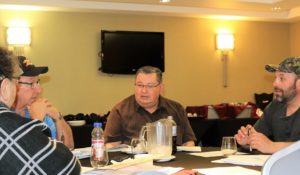Anishinabek Nation Governance Agreement vote projected for Spring 2019

By Laura Barrios
SAULT STE. MARIE, ON—Many First Nations across Canada are taking back control over the way they govern their communities. The member First Nations of the Anishinabek Nation are also looking at better and more culturally-based ways of governing. The Anishinabek Nation is currently negotiating one of the largest self-government agreements in Canada and will include the power to pass election laws outside of the Indian Act.
“For too many years, First Nation communities have elected their Chiefs and Councillors under the Indian Act with its short two-year terms for the Councils,” stated Martin Bayer, Chief Negotiator for the Anishinabek Nation in its negotiations with Canada. “That is simply not enough time to get anything done – we need to do things differently.”
The Anishinabek Nation formed the Governance Working Group to help guide the negotiation of the Anishinabek Nation Governance Agreement and recently met in Sault Ste. Marie, Ontario, to discuss the progress of the Anishinabek Nation Governance Agreement currently in the negotiations process and nearing completion.
“The Governance Agreement will recognize law-making powers for First Nations and the Anishinabek Nation in order to help preserve our languages and culture, determine who our citizens will be and how we elect our leaders,” explained Bayer. “As we move down our path to more self-determination, it will be important to remember that as we build more governing institutions for ourselves, like constitutions, election laws and the ways we choose to resolve disagreements, that we build these institutions to reflect who we are as Anishinaabe people and the values and gifts we were given.”
The Governance Agreement is not a treaty and will not take anything away from the constitutionally protected aboriginal or treaty rights; it is simply a practical opportunity to remove member communities from the election provisions of the Indian Act, and to recognize the power to pass own laws relating to elections, citizenship, culture and language, and laws to manage and operate their own government.
Consultations with the four regions of the Anishinabek Nation and member communities, as well as with the Chief and Councils, Chiefs Committee on Governance, and the Governance Working Group, have been on-going for many years now and helped to ensure that the Agreement reflects the needs of member communities going forward.
As the Agreement gets closer to completion, more information sessions with grassroots community members will be organized in the months ahead in order to help raise the awareness about the Anishinabek Nation Governance Agreement among band member voters.
The vote on the Anishinabek Nation Governance Agreement is projected to take place in May/June 2019.


